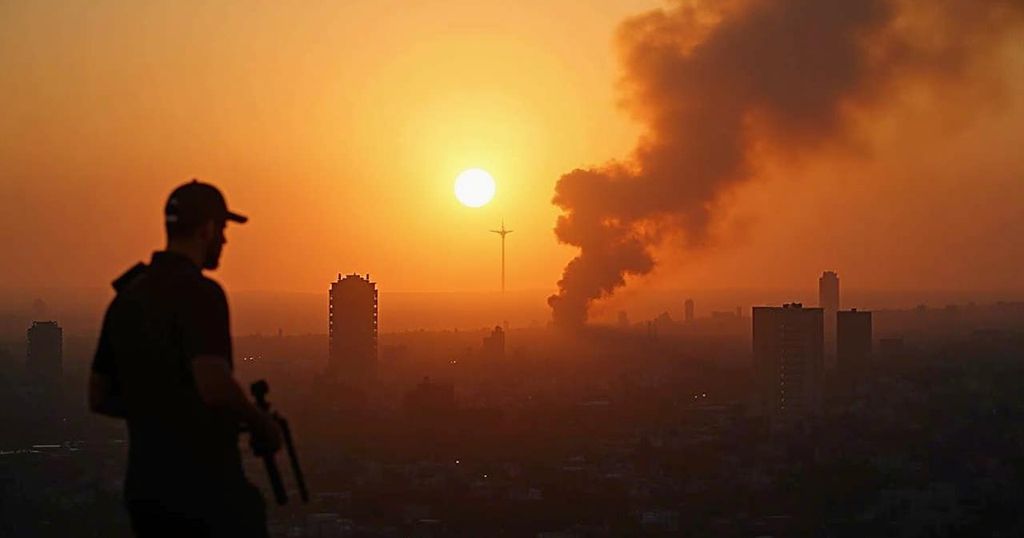Escalation of Israeli Airstrikes in Beirut Amid Ongoing Regional Conflict
Israeli airstrikes struck Beirut and expanded to Tripoli, targeting Hezbollah amid the ongoing Israel-Gaza conflict. The violence, escalating in the region since Hamas’s attack in October, has resulted in thousands of casualties and severe humanitarian crises, prompting calls from international leaders for arms embargoes against Israel. Historical tensions between Israel and Hezbollah continue to intensify, exacerbating the situation in Lebanon and Gaza.
Israeli airstrikes have intensified over Beirut overnight as the Israel Defense Forces (IDF) targeted Hezbollah positions within the region. Reports from Hezbollah’s media outlet, Al-Manar, confirmed that the southern suburbs of the Lebanese capital faced significant bombardment. Images from the area depicted large fires and plumes of smoke. In addition to the capital, these airstrikes have been reported in Tripoli, located in northern Lebanon, where Hamas announced the death of one of its field commanders. Concurrently, French President Emmanuel Macron called upon nations to cease their arms deliveries to Israel amid the ongoing conflict in Gaza. The Israel-Gaza war, now extending over several months, has dramatically escalated tensions throughout the Middle East. The conflict ignited on October 7, when Hamas launched an unprecedented cross-border raid on Israel, resulting in approximately 1,200 fatalities and numerous civilian hostages. In retaliation, Israel declared war and commenced a ground invasion, precipitating the largest displacement crisis since its establishment in 1948. In a notable event, Hamas leader Ismail Haniyeh was killed in July 2024, an act for which Hamas blamed Israel. The hostilities between Israel and Hezbollah—a militant group supported by Iran—have markedly intensified over the past year, leading to concurrent Israeli incursions into southern Lebanon. The death toll from Israeli airstrikes has surpassed 1,400, including notable figures such as Hasan Nasrallah, the longstanding leader of Hezbollah. The Israel-Lebanon border has a notable history of conflict, which significantly predates the contemporary conflict. In Gaza, Israel has conducted one of the most destructive military campaigns of this century, with tens of thousands slain and at least half of the population facing severe food scarcity. Despite mounting pressure from Western allies to increase humanitarian aid, Israel has thus far resisted these calls. The United States maintains a critical role in this conflict despite tensions between Israeli Prime Minister Benjamin Netanyahu and various U.S. political leaders, including President Biden. The U.S. continues its support for Israel through military aid and has historically vetoed or abstained from supporting United Nations resolutions calling for a ceasefire. The origins of both the Israeli-Palestinian conflict and the longstanding mistrust between these factions are complex, steeped in a deep historical context predating the establishment of the state of Israel in 1948, detailing more than a century of turmoil and disputes over territory and sovereignty.
The ongoing conflict between Israel and various Palestinian factions, including Hamas and Hezbollah, has its roots in deep-seated historical grievances that have evolved over decades. The events leading up to the current crisis include a complex narrative of territorial disputes, regional power struggles, and a series of violent confrontations that have impacted the Middle East significantly. The latest instigation, commencing with Hamas’s attack on October 7, 2023, has resulted in a declared war, accelerating violence in the region, especially in Lebanon, which has been caught in the crossfire of Israeli retaliation against Hezbollah. The involvement of international actors, including the United States, further complicates the situation, as geopolitical interests align with local conflicts.
In summary, the conflict in the region has escalated dramatically following the conflict ignited by Hamas’s surprise attack on Israel. The ensuing Israeli airstrikes targeting Hezbollah positions across Lebanon have raised global concerns, most notably voiced by international leaders such as President Macron of France. With no immediate resolution in sight, the humanitarian crisis in Gaza and the increasing violence along the Israel-Lebanon border underscore the critical need for diplomatic interventions and a ceasefire. The historical context of these disputes is vital for understanding the complexities involved in seeking a lasting peace.
Original Source: www.washingtonpost.com




Post Comment